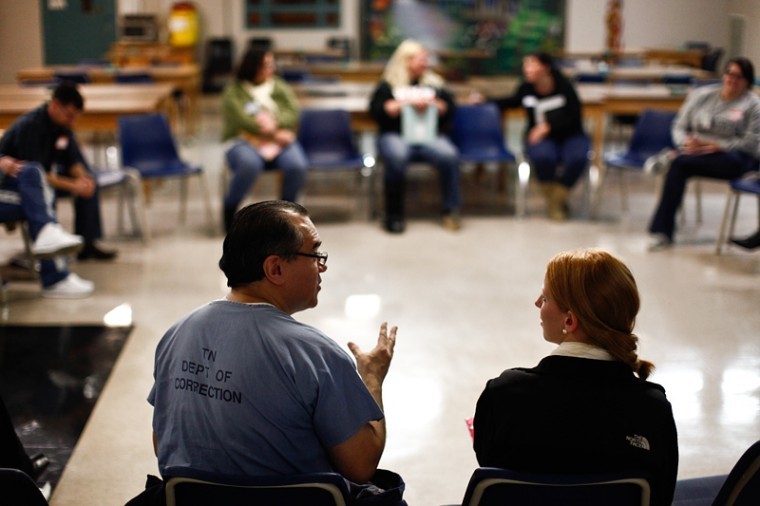WKU students go to class with incarcerated persons
December 6, 2011
A group of 25 students gather in a circle to discuss victims — who they are, their struggles and how to prevent the creation of new ones.
But this isn’t your average college class, or your average students.
Enter Victimology 200 — taught within the barbed wire fences and walls of Lois B. DeBerry Special Needs Facility, a Nashville prison. Once a week, for two hours on Thursday nights, 10 WKU students and 15 incarcerated persons, side by side, open up to one another about their lives, their pasts and the victims they have created, become or seen.
The format is not unheard of, and is the defining characteristic of The Inside-Out Prison Exchange Program, developed by Lori Pompa in 1997 at Temple University.
Since then, the program has grown and expanded to other schools throughout the nation, including WKU. Two WKU “Inside-Out” classes were previously taught at a women’s prison by Holli Drummond, associate professor of sociology, before sociology professor Kate King started her class this semester.
King, a professor of criminology at WKU, became certified with the program in 2006 and is also a member of the “Inside-Out” Steering Committee, a body that guides the goal and vision of the program.
“It’s a way to change how our students think about the world we live in,” King said.
“This is big stuff — it’s not just another college class.”
Russellville senior Karli Rutherford couldn’t agree more, though at the beginning of the semester she admitted feeling anxious about taking a class with inmates, some of them convicted sex offenders and murderers.
“We were all a little bit anxious,” said Rutherford, who is double majoring in sociology and history. “You have this image in your mind going in, but then we shook all their hands and did an ice breaker and that image melted away.
“This class has been life changing. It is the single most intellectually stimulating class of my college career.”
The “inside” students, referring to the inmates, are often times more prepared and ready to discuss the topic of the week than the “outside,” or WKU students, King said.
“In this environment they are equals,” King said. “They teach us as much, or more, as we teach them.”
Bowling Green sophomore April Madison, a psychology and sociology major, felt that the class truly is a life changing experience.
“There are some intense individuals in there,” Madison said, “but they are sharing with you. You see how sorry they feel. They’re telling you like it is.
“You don’t see people who made mistakes the same way.”
Like any other class, both “inside” and “outside” students take tests, write papers and are expected to add to the class discussion. For their required group project, the class decided to contribute a passage to the Tennessee Department of Corrections Inmate Handbook about what offenders need to know about the pain and suffering victims go through.
The class isn’t being offered next semester, but King is planning to teach an “Inside Out” class next fall.
“I’m already having withdrawals because I’m not teaching it next semester,” King said.
Students who are interesting in taking an “Inside Out” class undergo an interview process with King and must follow the rules of the program which include no last names and no contact with inmates outside of class.
“This is a contract — a promise they all make,” King said. “For us to have legitimacy in the prison this can’t be seen as a dating service.”
Rutherford encouraged students who may be interested in participating, but nervous or afraid, to step out of their comfort zones and be open to the experience.
Said Rutherford: “To see their side of the story and hear their voice…you can’t learn what I’ve learned in a classroom.”




















![Students cheer for Senator at Large Jaden Marshall after being announced as the Intercultural Student Engagement Center Senator for the 24th Senate on Wednesday, April 17 in the Senate Chamber in DSU. Ive done everything in my power, Ive said it 100 times, to be for the students, Marshall said. So, not only to win, but to hear that reaction for me by the other students is just something that shows people actually care about me [and] really support me.](https://wkuherald.com/wp-content/uploads/2024/04/jadenmarshall-600x422.jpg)



